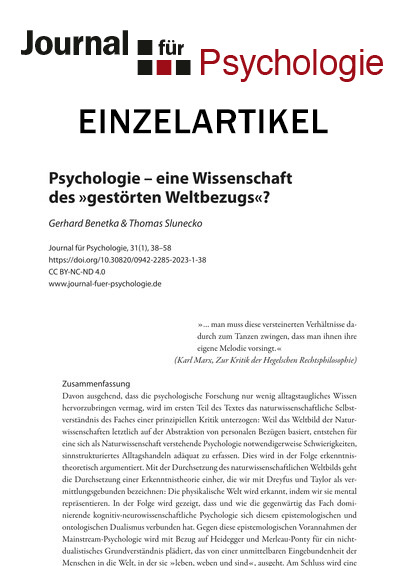Psychology - A Science of a Distorted World Relation?
DOI:
https://doi.org/10.30820/0942-2285-2023-1-38Keywords:
critique of psychology, phenomenology, contact theory, theory of knowledge, mental representation, dualism, Heidegger, Merleau-PontyAbstract
Departing from the fact that psychological research can produce only limited knowledge that is useful in everyday life, the first part of the article subjects the natural scientific self-conception of the discipline to a fundamental critique: Since the world view of the natural sciences is ultimately based on the exemption of first-personal reference, any psychology that sees itself as a natural science, inevitably has difficulties to adequately understand meaning-structured everyday action. Subsequently, this is discussed from an epistemological point of view. The establishment of the natural-scientific view of the world is accompanied by the establishment of a ›mediational‹ theory of knowledge (in the sense of Dreyfus and Taylor), according to which we recognise the physical world by representing it mentally. We then demonstrate that and how today’s dominant cognitive-neuroscientific strand of psychology is imbued with this epistemological and ontological dualism. Against these epistemological presuppositions of mainstream psychology and with reference to Heidegger and Merleau-Ponty, a case is made for a non-dualistic basic understanding that has at its starting point our immediate involvement in the world in which we ›live and move and have our being‹. In conclusion, we hint at a tentative synthesis: Representationalism is suitable for describing situations in which – in the face of disruptions – we detach ourselves from our original being involved with, our being embedded in the world, in order to readjust our relationship with the world. Reflecting on this process may serve to render visible lifeworldly preconditions of our everyday actions – but without the necessity to epistemologically solidify the disrupted reference to the world.
Downloads
How to Cite
Benetka, Gerhard, and Thomas Slunecko. 2023. “Psychology - A Science of a Distorted World Relation?”. Journal für Psychologie 31 (1):38-58. https://doi.org/10.30820/0942-2285-2023-1-38.
Issue
Section
Artikel
License

This work is licensed under a Creative Commons Attribution-NonCommercial-NoDerivatives 4.0 International License.
This license allows private use and unmodified distribution, but prohibits editing and commercial use (further information can be found at: https://creativecommons.org/licenses/by-nc-nd/4.0/).
The terms of the Creative Commons licence only apply to the original material. The reuse of material from other sources (marked with a reference) such as charts, illustrations, photos and text extracts may require further permission for use from the respective copyrights holder.


